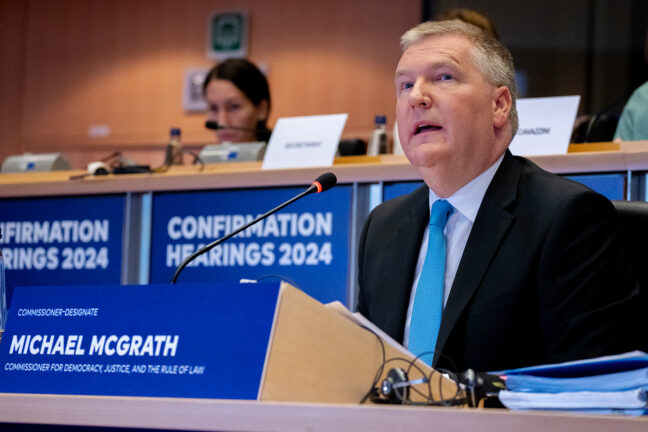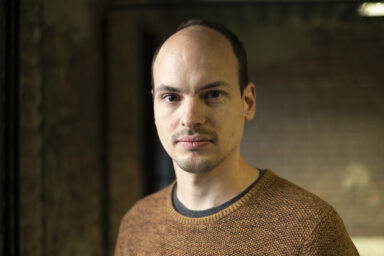The European Commission’s plan to spend billions on media and democracy support draws caution from lawmakers seeking clarity on independence, funding and safeguards. Commissioner Michael McGrath defends the new AgoraEU programme as a bold response to disinformation but offers few concrete details.
The European Commission aims to allocate billions of euros to media and democracy support within the EU’s next long-term budget, but lawmakers remain unconvinced.
“In July, the Commission presented our proposals for an ambitious and dynamic next MFF”, Commissioner McGrath, who is responsible for democracy, justice and rule of law, told MEPs from the Democracy Shield Committee this week. “The new AgoraEU program would promote EU values, including democracy. It creates new opportunities for synergies and paves the way for upcoming initiatives such as the democracy shield.”
More than 90 per cent of respondents to our consultation rated disinformation and the inauthentic use of social media as a very high risk to democracy – Commissioner Michael McGrath
He set out three priorities: a European Centre for Democratic Resilience to monitor foreign manipulation, a Media Resilience Programme to support journalism, and fresh investment in citizen participation. The urgency, he argued, is clear. “More than 90 per cent of respondents to our consultation rated disinformation and the inauthentic use of social media as a very high risk to democracy”.
Billions for media and democracy
Mr McGrath mentioned two strands under the AgoraEU budget as central to democracy. The CERV+, with a proposed budget of €3.6bn, will “support citizens in their participation and engagement in the democratic life, as well as free and resilient electoral and other democratic processes”. While the Media+, with €3.2bn, will support “the protection of journalists and media outlets against threats, addressing risks to media freedom and pluralism, [and] the detection and fight against disinformation and foreign information manipulation”.
For the commissioner, this is “a very significant boost of funding generally for the media in the next MFF”. Additionally, it touches a wide spectrum of sectors, “including audiovisual, gaming and news industries”.
You might be interested
In addition, he confirmed the launch of a new Media Resilience Programme. As announced by Commission President Ursula von der Leyen in her State of the Union speech. “It will support independent journalism and media literacy. It will underline our efforts to support and contribute to a sustainable news media sector, as well as to reinforce the democratic resilience of our societies. Including by strengthening media literacy”, he said.
The Commissioner also promised a separate EU civil society strategy, aimed “to support civil society actors and further protect them against undue pressure and threats.”
A European Centre for Democratic Resilience
A centrepiece of the plan is a new European Centre for Democratic Resilience. Its role will be to pool expertise, link fact-checking networks across all EU languages and connect existing mechanisms like the rapid alert system.
“The Commission will set up a European Centre for democratic resilience”, McGrath said. “This centre will bring together a community of experts to support the capacity of member states to monitor, detect and coordinate responses on FIMI (Foreign Information Manipulation and Interference) and disinformation in the EU”. McGrath stressed that the centre would not operate in isolation, promising cooperation with member states, outside experts and, where relevant, partners in neighbouring countries.
This centre will bring together a community of experts to support the capacity of member states to monitor, detect and coordinate responses on foreign interference and disinformation in the EU – Commissioner Michael McGrath
But the details of the centre are still unclear. “This will be built with member states and a supporting role from the Commission and the External Action Service. It is a project that we are scoping out. The precise nature of governance and its structure is subject to a final decision”, he admitted.
Above all, he said, the new body must be credible. “What is fundamental is that it has to be trusted. If people don’t trust this new centre, it will be hamstrung from the very beginning”.
Safeguarding elections
Commissioner McGrath insisted that the integrity of elections remains a national competence, but argued Brussels can add value by reinforcing cooperation: “We will continue to support the member states in their efforts to ensure the fairness and integrity of electoral processes, including through the European Cooperation Network on Elections”.
He also flagged an upcoming action on the safety of political candidates and elected representatives, with a particular focus on women, and warned about “the growing importance of influencers and the use of AI in an electoral context.”
Lawmakers concerns
While most political groups acknowledged the risks of disinformation and foreign interference, the hearing exposed wide differences of opinion over how Brussels should act.
Many MEPs complained that the plans were heavy on ambition but light on detail. Centre-right lawmakers demanded guarantees on independence and sustainable financing. Rapporteur and MEP Tomas Tobé (EPP/SWE) warned: “It is important that this new entity will be independent… Because if we don’t have the feeling of independence, this kind of centre would otherwise perhaps have a risk to be undermined from the start”. He pressed McGrath to say which budget lines would provide “sustainable and long-term” support.
From the centre-left, the complaint was about focus. Ana Catarina Mendes (S&D/PRT) asked. “What is the main threat right now to European democracy? What measures are in the pipeline in the commission to guarantee that elections can continue to be free?” she asked McGrath.
Conflict of interest
Suspicion fell on the means of bankrolling EU-funded initiatives. MEP Alexandra Geese (Greens/GRC) challenged McGrath directly: “How do you protect media freedom when algorithms make sure that propaganda has higher reach than media?”. She also raised questions about funding sources. Google partly finances the European Media and Information Fund, which backs fact-checkers, contributing €25 million to the program over five years. “Do you see this as a conflict of interest?” she asked.
Far right fears censorship
The harshest criticism came from the far right. National-conservative and far-right members warned the plans could easily morph into a censorship tool favouring “left-wing narratives”. “Why is the Commission using the EU budget to intervene in elections, mass media and civil society?” asked one, accusing Brussels of straying into national competencies. Patriots’ Fabrice Leggeri went further, branding the concept “a 1984 universe” run by unelected experts.
Why is the Commission using the EU budget to intervene in elections, mass media and civil society? – MEP Fabrice Leggeri (PfE/FRA)
McGrath rejected those accusations. “There will not be any censorship. There will be support for freedom of expression, to ensure that people highly critical of me or highly critical of the Commission can have their voice heard,” he insisted. “The only ideology here is about protecting European democracy”.
DSA frustrations
Lawmakers also vented frustration over the Commission’s enforcement of the Digital Services Act, which sets obligations for large online platforms. Committee chair, MEP Nathalie Loiseau (Renew/FRA), criticised the commission for moving too slowly against big platforms. “Were the investigations lost? Are you afraid?” she asked.
Mr McGrath refused to discuss individual cases. “We don’t comment on individual investigations. But I can reassure you that we will uphold the law that has been passed by the member states and by this Parliament”, he said. “The Commission is diligently proceeding with the open investigations and will come to a conclusion as quickly as possible. We have to acknowledge the reality that any adverse decision is going to be challenged”.











